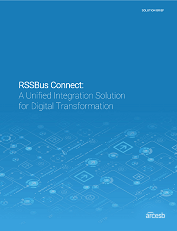CData Arc: A Unified Integration Solution for Digital Transformation

(Product Guide)
Integration is Key to Digital Transformation
Organizations are undergoing digital transformation, using digital technologies to optimize business operations and create value. The road to digital transformation is paved with integration. Whether you need to streamline operations, automate business-to-business processes or transfer data to data lakes/warehouses, integration plays an indispensable role.
Data integration enables organizations to simplify internal workflows by sharing data application-to-application (A2A), automate business-to-business (b2b) workflows through electronic data interchange (EDI) and take advantage of analytics by moving data into data warehouses and data lakes.
But integration is easier said than done, requiring the exchange of many data types, including:
- Structured data from databases
- Unstructured text and social media information
- Streaming data from IoT sensors
Making matters more challenging:
- Data may need to move in multiple directions between cloud and on-premise applications and databases
- A2A integrations must consider the many data types, formats, APIs, databases, email, and more
- Customizations in applications add complexity, so sharing data A2A requires complex manual processes, extensive coding or expensive services
And b2b integration is even more complex, requiring expertise in 50-year-old technologies like EDI that vary widely and use highly technical structures and syntaxes.
CData Arc Facilitates Integration
Existing, legacy integration solutions require complex manual processes, coding, expensive services, or archaic technologies, often requiring consultants for setup and configuration.
In contrast, CData Arc is a modern solution that dramatically simplifies integration across on-premises and cloud-based processes, services, applications and data — within organizations and to external partners. It provides comprehensive application and data integration through a suite of connectors that simplify the development, execution and governance of integration flows — no coding or complex development tools required.
In this article, we provide a brief overview of CData Arc's capabilities. In our comprehensive product guide, we cover the full technical capabilities that make CData Arc an ideal iPaaS solution for automating integration flows quickly, across on-premises and cloud-based processes, services, applications and data within and across organizations.
Download Full Product Guide
Standardized integration using connectors and APIs
Central to the CData Arc integration architecture are standardized connectors that can be used to build workflows that provide a global view of an organization's integrations.
Connectors can be used for:
- Application integration
- Database integration
- EDI messaging
- Managed file transfer (MFT)
- APIs
- Document generation
- And more
Global 360-degree view of multi-step data exchange workflows
Most data integration solutions require users to configure and view each integration step as an isolated process or event. With CData Arc, a common workflow canvas maps all processes that function across the entire application. Our end-to-end workflows provide visibility into all integrations in one place, so users can see how each integration impacts each process.
API-driven architecture
While the CData Arc UI is great for configuring relatively simple, straightforward integrations, many organizations need to automate complex, redundant tasks or use CData Arc's capabilities from within an external application. Our REST-based management API exposes all features of the application through a modern web API interface like REST, JSON, or OData.
Comprehensive monitoring and logging
Audit trails/logs are necessary for regulatory compliance and simplify troubleshooting by allowing customers to track a message's location when errors arise. CData Arc provides audit/log trails that offer a complete history of how each message was processed.
Scheduling
Users have flexible control over when integration jobs occur with CData Arc. They can create event-driven triggers to perform an action or employ fine-grained control over scheduling.
Flexible deployment
CData Arc provides a wide range of flexible deployment options to meet customer requirements. CData Arc can work with any web server for Java or Windows, and many options are available for DMZ deployment, including on-premise, in the cloud, hosted by CData Arc or with a hybrid deployment.
Security
CData Arc secures customer data through a comprehensive range of security protections, including:
- Authentication
- Certificate management
- Secure file transfer
- Encryption
- Secure access
Full extensibility
For organizations with more sophisticated requirements, RSBScript is a cross-platform configuration language that allows users to extend CData Arc in a highly flexible manner.
Hybrid integration
CData Arc combines cross-functional integration with a universally available hybrid integration solution, spanning on-premises, API management, Integration Platform as a Service (iPaaS), and Integration Software as a Service (iSaaS).
Get the Full Product Guide
Get a complete rundown of CData Arc's powerful features in our product guide.
Download Full Product Guide